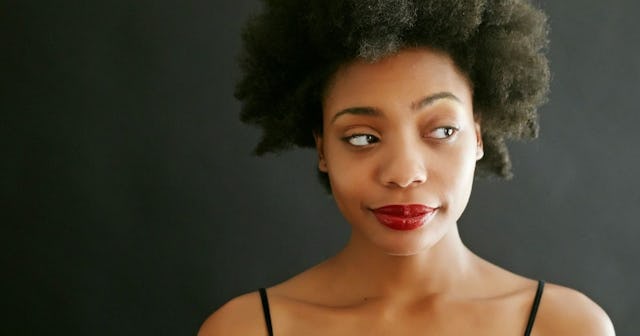Owning My Blackness, Hair and All

Black women and our hair, the act of getting it done, spending hours (typically the better part of an entire day, or say 5+ hours) at the salon, the waiting, the routine of it all, is an activity that has, in some ways, defined us. It has allowed us to create a kind of community among ourselves, a haven of sorts where we can figuratively wash away the troubles around us.
As a child, going to the salon was a family affair. Every other Saturday morning, I’d drive with my maternal grandmother, aunts, and cousin, and we’d sit for long periods. We would ping pong between the dryer and the hairstylist’s chair, waiting our turn to get our ‘do done. For myself and many other Black women, it was one of the ways we found a space to explore our own identity.
For so many years, more than I’d like to admit to, I fought against getting the hairstyle I have today, sisterlocks. In the ’80s I donned a Jheri curl. In the ’90s, it was a svelte cropped cut, which I’d sometimes swap out for long synthetic braids which were interlocked into my hair. Then in the ‘00s came the flat-iron.
By 2011, I’d had enough of my trips to the salon, enough of traveling the winding road to find another hairstylist because I’d moved to a new city. I was ready to embrace who I was and root myself a little deeper into my Blackness, not to mention save money. I decided to do the big chop and wear the hair on my head exactly as it grew out of it: no alterations or any modifications of any kind.
As my hair grew out, so did my confidence. I had more money in my pocket, opting to take on the responsibility of my hair maintenance on my own. I also grew into my skin more. I began to own my Blackness in a way that I’d never done before. Not only did I have hair confidence, but confidence in my body too. My thighs, the same ones I once thought were too big and jiggly, I appreciated more for carrying me. And I chose to view my nose and my dark skin as badges of honor, finally appreciating them for their beauty.
My wife, on one of our very first dates, asked me “Have you ever tried dreadlocks? I love them!” The disgusted look on my face and the explanation that followed turned her question into a yearly one, but one she would never let go of. After my twin daughters were born, I could not bear giving myself five minutes to take a shower let alone commit two hours every other day to twist my hair and maintain it the way it needed. The idea of committing to something as permanent as sisterlocks became more of a reality with each passing day. So I spent twenty-seven hours in my new hairstylist’s chair, known as a loctician in the sisterlocks community — with a sore butt and all, kind of like what your ass feels like after your first spin class. I then paid her close to $1,000 for her work and had 520 mini locs to show for it. I was all in; there was no turning back now.
With my hair done and a slight fear that I would not like it tomorrow when I looked in the mirror, this ‘do was something I said I would never actually do. So, why now, in 2020, did I decide to finally lock my hair? Why did I find myself losing countless hours on YouTube, Instagram, and Pinterest searching up “sisterlocks” or “natural hair” or drooling at the sight of Naptural85’s loose luscious curls or Jess_inprogress_’s gorgeous locks? This hair community, albeit online, was now my community. I could “be” in the salon with thousands of other Black women, with sisterlocks or natural hair, who for so many years I would have given the side-eye to.
Now I am one of them. Not only were they introducing me to different hairstyles or ways of life, but they were (without even knowing it) reintroducing me to myself, to who I am as a Black woman. With each swipe left or right on Instagram, I felt empowered to live more confidently in my skin. I began to pack up the notion I’d told myself over the years, that dreadlocks and sisterlocks would make me “too Black.” If this was the story I had told myself, then wearing my straightened ‘do meant I was not Black enough, didn’t it?
What I truly know now, as a 38-year-old Black woman, is this: I am me. I am a work in progress. I am not searching any longer for something on the outside to make me whole on the inside. All I need is right here within my Black body, hair and all.
This article was originally published on